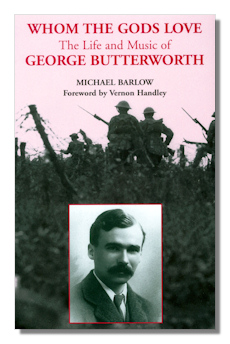
The Internet's Premier Classical Music Source
Related Links
-
Introduction
Acoustics
Ballet
Biographies
Chamber Music
Composers & Composition
Conducting
Criticism & Commentary
Discographies & CD Guides
Fiction
History
Humor
Illustrations & Photos
Instrumental
Lieder
Music Appreciation
Music Education
Music Industry
Music and the Mind
Opera
Orchestration
Reference Works
Scores
Thematic Indices
Theory & Analysis
Vocal Technique
Search Amazon
Recommended Links
Site News
 Book Review
Book Review
Whom The Gods Love

The Life and Music of George Butterworth
Michael Barlow. Foreword by Vernon Handley.
Illustrated. Catalogue of works. Discography. Bibliography.
Toccata Press (2009)
First published 1997. New paperback edition. 204 pages.
ISBN-10: 0907689434
ISBN-13: 978-0907689430
Admittedly a minor composer, with a small number of works, George Butterworth is nonetheless loved for the quality of his music. Best known for the orchestral rhapsody, A Shropshire Lad, and The Banks of Green Willow, his published compositions include only four short but beautiful orchestral works and some songs and song cycles, notably based on the poetry of Hausman. He might well have become a major composer had he not been killed in the battle of the Somme in 1916. After all, his older friend Ralph Vaughan Williams, whose output had also been relatively modest at that date, survived that most stupid of wars to write nine symphonies over many decades. Ironically, in one of the Hausman poems set by Butterworth, "On the Idle Hill of Summer," a daydreamer hears soldiers marching in the distance, meditates on the folly of war, but decides to go to war himself; Butterworth did just that. He enlisted in August 1914.
Butterworth's music was strongly influenced by folk tunes. Like Vaughan Williams he collected hundreds of them. He also collected dance tunes and intricate steps. He was an early and active member of the English Folk Dance Society. An exceptionally accomplished dancer himself, Butterworth observed and practiced Morris dances and sword dances. These achievements have to be considered part of his musical legacy. Barlow's book includes a very interesting chapter about this and includes a detailed catalogue of the songs and dances collected by Butterworth.
Barlow discusses Butterworth's musical compositions in detail, even individual songs, with musical illustrations. He notes that one song, "Is my Team Ploughing," has been called "one of the great songs of the world." In an appendix Barlow provides such details as are known even about the unpublished works. The composer destroyed much of his early work before the war, and he wrote nothing during it. Fortunately, he bequeathed his musical works to Vaughan Williams.
Butterworth and Vaughan Williams were friends for Butterworth's last ten years. and a chapter is given to this. Butterworth encouraged RVW to write the London Symphony, and even helped edit it, at a time when Vaughan Williams was by no means sure he wanted to be a symphonist at all. Butterworth wrote an early review of this work and published it in the magazine of the Royal Academy of Music. In it he notes the technical difficulties of working with what was then a new and original style. His short article is reprinted as an appendix.
Barlow writes well and this paperback edition book is attractive, sturdily bound with gathered sections and very good paper.
Recommended.
Copyright © 2010, R. James Tobin



















